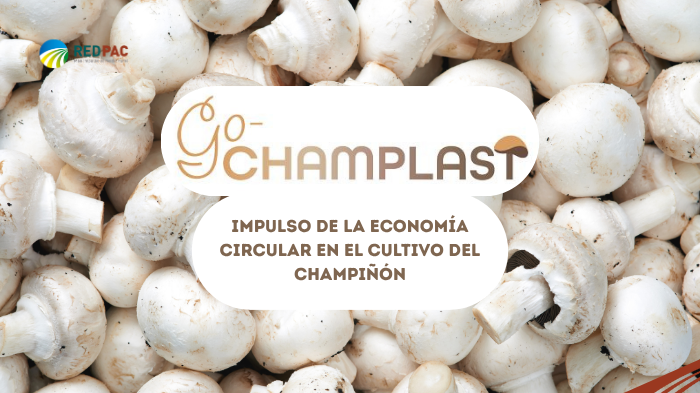
04 de July de 2025
Innovación
Resiliencia y competitividad
The CHAMPLAST Operational Group is committed to recovering the waste generated by the sector to create sustainable products and improve agricultural profitability.
- The CHAMPLAST Operational Group is committed to recovering the waste generated by the sector to create sustainable products and improve agricultural profitability.
- The initiative has managed, through different processes, to obtain advanced vegetable carbons, compostable "biofilms" and essential oils with antifungal properties.
La Rioja leads mushroom production in Spain, accounting for almost half of the national volume and 8% of the European total. However, this intensive production also entails significant waste generation, such as post-cultivation substrate—no longer suitable for new crops—and single-use agricultural plastics. Managing these byproducts represents an environmental and economic challenge for farms.
Faced with this challenge, the CHAMPLAST Operational Group (OG) emerged , an initiative whose objective is to transform waste from the mushroom sector into useful and sustainable resources that contribute to more efficient and circular agriculture.
Key points
The GO has focused on three main lines of action:
- Obtaining "advanced char" —an advanced form of "biochar" or charcoal—from Mushroom Post-Cultivation Substrate (MPCS) and pruning waste, using a hydrothermal process that is more efficient than conventional thermal methods. This material has been evaluated for use as an agricultural amendment and as a partial substitute for peat—a natural organic material composed primarily of decomposed plant matter—in mushroom cultivation.
- Development of compostable biofilms —thin films made from biodegradable materials—specifically designed for mushroom and oyster mushroom cultivation. These films can withstand the entire production cycle and compost together with the spent substrate, eliminating the need for subsequent separation and recycling.
- Extraction of essential oils from aromatic plants grown with advanced charcoal with potential for use as biological control agents against common mushroom diseases, such as "hair" (which causes rot and unpleasant odor) and "mole" (which deforms the mushroom).
“The project fits completely within the circular economy,” explains Emilio Rascón, spokesperson for the La Rioja Mushroom Research Technology Center and coordinator of the GO. “We have obtained very promising results with advanced charcoal and biofilms. The trials have shown that it is possible to reduce peat in mushroom cultivation by up to 20% without losing productivity, and that the compostable films withstand growing conditions well, degrading at the end of the process. This represents an environmental improvement and also economic efficiency for the sector.”
Results and next steps
According to Rascón, although the torrential rains caused by the DANA in the Valencian Community, where these types of tests were being carried out, prevented the completion of some field-scale validations, the progress achieved during the project has been significant:
- Production of advanced char from post-cultivation substrate and pruning residues, with agronomic applications in mushrooms and aromatic plants.
- Partial replacement of peat used in mushroom cultivation with advanced charcoal, achieving 20% replacement without affecting productivity.
- Development of two compostable biofilms that adequately resisted the real-life cultivation conditions of both button mushrooms and oyster mushrooms.
- Initial validation of the compostability of the films, currently in the decomposition phase in specialized facilities.
- Laboratory testing of the antifungal effect of essential oils on mushroom diseases, with positive results.
The project concludes with significant progress toward a more environmentally friendly farming model that utilizes waste as a resource and reduces dependence on fossil fuels.
Funding and participants
The GO CHAMPLAST project has been funded with €560,868 through the European Recovery Instrument (NextGenerationEU), within the framework of the 2014-2022 National Rural Development Programme, supported by the European Agricultural Fund for Rural Development (EAFRD).
It has also been coordinated by the La Rioja Mushroom Research Technology Centre (CTICH) in collaboration with:









